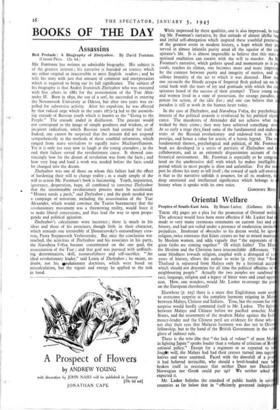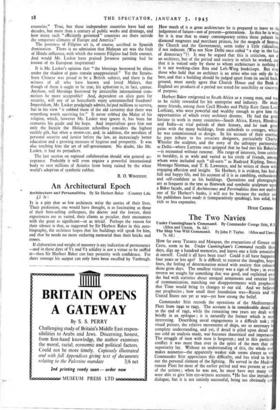Oriental Welfare
Peoples of South-East Asia. By Bruno I.asker. (Gollancz. 10s.
THESE 183 pages are a plea for the promotion of Oriental welf. The advocacy would have been more effective if Mr. Lasker had made so very many erroneous statements on current fact and p history, and had not veiled under a pretence of moderation invinci prejudices. Intolerant of obstacles to his dream world, he igno religion, twice reiterates that Islam creates no bar to mixed marria by Moslem women, and adds vaguely that " the exponents of great faiths are coming together." Of which faiths? The Hi the Moslem and the Christian have irreconcilable differences. same blindness towards religion, coupled with a disregard of 1, years of history, allows the author to write (p. 173) that " So Thailand is separated frOM Malaya only by a historical accid• which should not determine for all time the political affinities of neighbouring people." Actually the two peoples are sundered race, language, religion and a legacy of bitter wars and cruel oppr sion. How, one wonders, would Mr. Lasker re-arrange the pi on the European chessboard?
Elsewhere (p. 105) there is a sneer that Englishmen seem una to overcome surprise at the complete harmony reigning in Mal. between Malays, Chinese and Indians. True, but the reason for t surprise would hardly commend itself to Mr. Lasker. The fight between Malays and Chinese before we pacified anarchic Ma States, and the resentment of the modern Malay against the In money-lender and the Chinese peril are evidence for those who not shut their eyes that Malayan harmony was due not to Orie fellowship, but to the hand of the British Government in the vel glove of indirect rule.
There is the trite jibe that "the lack of valour" of most Mal in fighting Japan " speaks louder than a volume of criticism of Bri colonial policy." Except for a regiment or so reported to h fougit well, the Malays had had their creases turned into tapp knives and were unarmed. Faced with the downfall of a peo it had believed invincible, why should a level-headed race broken itself in resistance that neither Dane nor Dutch Norwegian nor Greek could put up? We neither asked expected it.
Mr. Lasker belittles the standard of public health in colo countries as far below that in " efficiently governed independ
countries." True, but those independent countries have had not decades, but more than a century of public works and drainage? and how many such " efficiently governed " countries are there outside the temperate climates of Europe and America?
The poorness of Filipino art is, of course, ascribed to Spanish domination. There is no admission that Malayan art was the fruit of Hindu influence, with which the remote Filipino had little contact. And would Mr. Lasker have praised Javanese painting had he known of its European inspiration?
It is Mr. Lasker's opinion that " the blessings bestowed by aliens under the shadow of guns remain unappreciated." Yet the Straits- born Chinese was proud to be a British subject, and there is the witness of all who have known and loved Malays, that though of them it ought to be true, his aphorism is, in fact, untrue. Anyhow, will blessings bestowed by irresistible international com- mittees be more acceptable? And, dependent on alien guns for security, will any of us henceforth enjoy untrammelled freedom? Imperialism, Mr. Lasker grudgingly admits, heaped millions to survive, but in his view " it robbed them of the old certainty that there was something worth surviving for." It never robbed the Malay of his religion, which, however Mr. Lasker may ignore it, has been for centuries his guide and his hope. And imperialism gave him not only the bicycle the Moluccan schoolboy considers the highest earthly gift, but often a motor-car, and, in addition, the novelties of personal security and justice before the law, an increasingly better education and a growing measure of hygiene and prosperity. It was also teaching him the art of self-government. No doubt, like Mr. Lasker, it had its prejudices.
The last section on regional collaboration should win general ac- ceptance. Probably it will even require a powerful international body to save millions of Asiatics from being ruined by the white world's adoption of synthetic rubber.
R. 0. WINSTEDT.



























 Previous page
Previous page